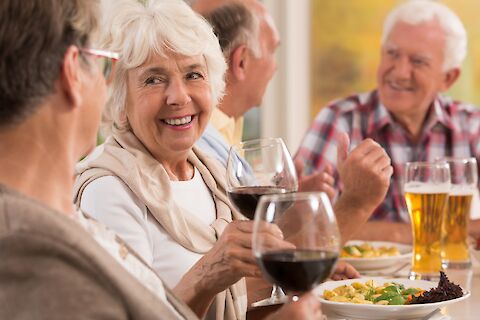
New Year's Eve is just around the corner, and for many seniors, it's a time to get together with friends and family and enjoy some drinks and good food. But of course, drinking should be done responsibly. That is why we've put together this guide for seniors detailing the best tips, guidelines, and recommendations regarding alcohol consumption on New Year's Eve.
Considerations for Seniors Drinking
Alcohol use is common among seniors. According to the National Council on Aging, about 50% of persons over the age of 65 reports having taken alcohol in the past year. Some drink to cope with loneliness, anxiety, or depression. Others to celebrate special occasions or to relax.
However, it's essential for seniors to know that drinking can come with potential risks.
Decreased Tolerance
As people age, their tolerance for alcohol typically decreases. Therefore, seniors may become impaired by lower levels of alcohol intake than they had been used to in the past. Reduced tolerance puts seniors at a higher risk for car accidents, falls, and other injuries.
Increased Risk of Health Conditions
Drinking too much can lead to a higher risk for certain illnesses, from liver disease to heart problems and stroke. It can also increase the risk of developing dementia or exacerbating mental health conditions such as depression or anxiety.
Interactions with other Drugs
Seniors should also be aware of potential interactions between alcohol and any medications they may be using. Alcohol can interact with certain drugs and increase their effects on the body. Interactions can lead to unexpected health complications or side effects. Examples of these drugs include:
- Cough syrup
- Aspirin
- Pain medication
- Anxiety or depression medicine
- Sleeping pills
- Cold and allergy medicine
- Acetaminophen
Worsen Existing Health Conditions
Beyond that, alcohol can make conditions like diabetes, high blood pressure, mental disorders, liver problem, etc., worse.
Drinking Alcohol Guidelines
The National Institute on Alcohol Abuse and Alcoholism, NIAAA has created a guideline for seniors. They are as follows:
- Seniors in good health who don't take medication can decide not to drink or to drink in moderation by limiting intake to 1 drink or less in a day for women or 2 drinks or less per day for men.
- Seniors should not consume more than three drinks on any given day.
- Less alcohol intake is always better than more alcohol intake.
- Seniors with health issues or those taking medications should limit their alcohol intake or not take it for the reasons described above.
Caregivers at Senior Health Can Help
Drinking alcohol is often a part of celebrating New Year's Eve for many people. But for seniors, it requires extra caution and consideration to ensure that they remain safe and healthy. Caregivers at Senior Helpers South Coast will help ensure a senior loved one has the best time possible while remaining within safe drinking limits. They can also provide medication management, diet and nutrition advice, physical activity guidance, and more.
Seniors and their loved ones looking for extra support on New Year's Eve celebrations can find the help they need at Senior Helpers South Coast. We serve seniors in Fountain Valley, Huntington Beach, Newport Beach, Laguna Beach, Mission Viejo, Costa Mesa, and Laguna Nigel. Contact us today to learn more about our services and how we can help you and your family celebrate responsibly.